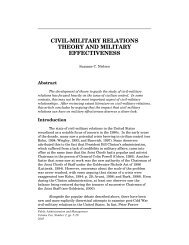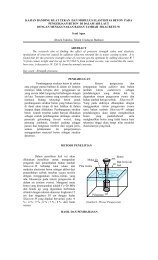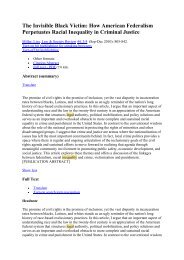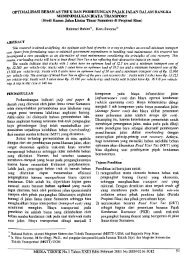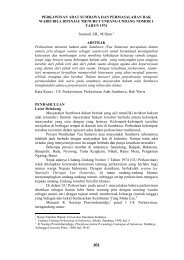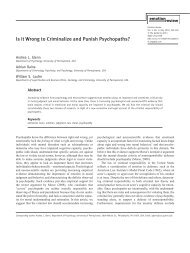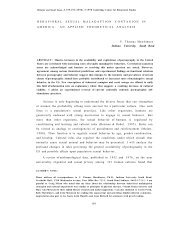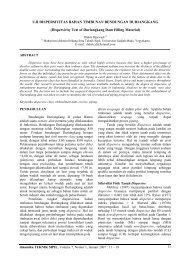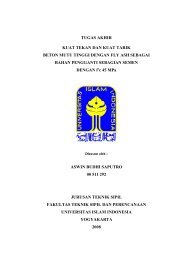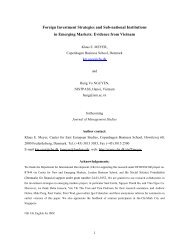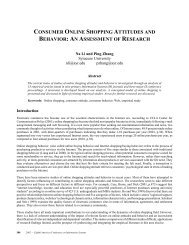Ski – resort and regional development: profile of visitors ... - E-Journal
Ski – resort and regional development: profile of visitors ... - E-Journal
Ski – resort and regional development: profile of visitors ... - E-Journal
You also want an ePaper? Increase the reach of your titles
YUMPU automatically turns print PDFs into web optimized ePapers that Google loves.
142<br />
Yao-Yi Fu, Am<strong>and</strong>a K. Cecil, Suosheng Wang, Sotiris H. Avgoustis<br />
What is happening in Europe?<br />
With its decreasing <strong>and</strong> ageing population, Europe can no longer depend on Intra-<strong>regional</strong><br />
travel to sustain its travel <strong>and</strong> tourism industry. Nor can it afford to ignore the fact that Chinese<br />
<strong>and</strong> Indian tourists spend more on holiday than Their European counterparts. Without a doubt,<br />
the Asian tourist is pivotal to the future <strong>of</strong> Europe’s travel <strong>and</strong> tourism industry <strong>and</strong> European<br />
countries now need to take stock <strong>and</strong> develop their infrastructure <strong>and</strong> services. If slow to<br />
Respond, Europe runs the risk that other competing regions, such as the Middle East, Latin<br />
America <strong>and</strong> Africa, as well as other countries within Asia Itself, will realize more <strong>of</strong> the<br />
potential <strong>of</strong>fered by these high-spending tourists.<br />
So, what Europe will do is to adapt its politics to real <strong>and</strong> biggest change in new tendencies.<br />
Also language issues are another important not only for Europe, but also for our country <strong>and</strong><br />
continue to undermine Albania’s tourism product <strong>of</strong>fer. Visiting Friends <strong>and</strong> Relatives (VFR)<br />
<strong>and</strong> Bollywood tourism boom is another characteristic that should analyze in Europe tourism.<br />
The alpine countries such as Switzerl<strong>and</strong>, Austria <strong>and</strong> France are also popular, as they are the<br />
location for many Bollywood films today, while the Kashmir region remains unstable.<br />
SURVEY<br />
Our survey <strong>of</strong> 100 managers from large <strong>and</strong> medium-sized hotel groups in our region indicated<br />
that the main reason for introducing environmental initiatives was on the basis <strong>of</strong> cost-savings<br />
rather than the benefits for the environment. Indeed, care <strong>of</strong> the environment was not as<br />
important as health <strong>and</strong> safety, quality, cost or customer care in the decision to introduce such<br />
changes. The introduction <strong>of</strong> environmental initiatives was <strong>of</strong>ten hindered by controls <strong>and</strong><br />
procedures operated by head <strong>of</strong>fice. Other research has indicated that many large hotel groups<br />
believe some “sustainable” practices, such as water <strong>and</strong> energy conservation, to be in conflict<br />
with the principle <strong>of</strong> luxury accommodation <strong>and</strong> might adversely affect the enjoyment <strong>of</strong> a<br />
guest’s stay.<br />
The case study <strong>of</strong> the perception <strong>and</strong> implementation <strong>of</strong> sustainable tourism by tourism<br />
enterprises in the region <strong>of</strong> Vlore-Sar<strong>and</strong>e, derived from focus group research, revealed a<br />
slightly different perspective on the issue. As with previous research, respondents could<br />
provide no clear definition <strong>of</strong> the concept <strong>of</strong> sustainable tourism, <strong>and</strong> were consequently very<br />
wary <strong>of</strong> those who sought to encourage adoption <strong>of</strong> theoretical concepts with no practical<br />
definition. Nevertheless, the groups were receptive to new ideas <strong>and</strong> were able to identify<br />
workable practices that they felt would contribute to local sustainability, namely the alleviation<br />
<strong>of</strong> traffic congestion through public transport initiatives; directing <strong>visitors</strong> to resilient destinations<br />
by effective marketing; encouraging local purchasing <strong>and</strong> environmental education; <strong>and</strong> by<br />
energy conservation. Whether all suggestions were thoroughly thought through is open to<br />
question, especially as one suggestion to alleviate traffic congestion was to undertake road<br />
improvements. The main obstacles to developing <strong>and</strong> implementing sustainable tourism were<br />
the perceived extra costs <strong>and</strong> the mistrust <strong>of</strong> local government.<br />
Tourism Today - Fall 2007 - Full Paper



